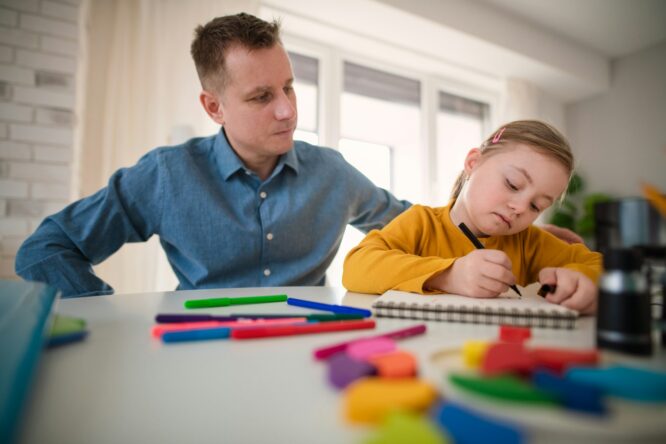Kids absorb more from us than we realise.

It’s not just what we say—it’s what we do when we’re stressed, how we talk to people, how we treat ourselves. Even the little habits we don’t think twice about can end up shaping their view of the world and themselves. Nobody’s aiming to mess their kids up deliberately, but if we don’t check our own behaviour, they’ll start picking it up by default. Here are the things worth being more aware of—because chances are, your kid’s already watching.
1. Talking negatively about your body

If a child constantly hears a parent complain about their weight, their wrinkles, or how they look in certain clothes, they start believing that’s normal, especially if they’re hearing it from someone they love. It plants the idea early that appearance is something to criticise, not accept.
Even offhand comments like “I look gross today” or “I need to lose weight” can stick with them. What kids need is a model of body respect, not perfection. Speak kindly about yourself, even if you’re still working on it. They’ll learn to do the same.
2. Snapping when you’re stressed

We all get overwhelmed, but how we handle it teaches kids how to process their own frustration. If every bad day leads to slammed doors, shouting, or sulking, that becomes the emotional blueprint they copy later. You don’t need to be zen all the time, but narrating your feelings (“I’m really stressed, so I’m going to take a breather”) shows them it’s okay to feel big things—it’s how you deal with it that matters.
3. Gossiping about or judging other people

When kids hear adults mock others—whether it’s someone’s outfit, voice, or lifestyle—it normalises being critical behind people’s backs. Even if it’s framed as harmless, it teaches them to judge first instead of understand. They pick up quickly on who’s considered “weird” or “less than,” and that can shape how they treat other people. Speaking with kindness, even about people you don’t like, gives them a far more useful life skill than sarcasm ever will.
4. Always putting yourself last

If a child sees a parent constantly exhausted, running on empty, or never taking time for themselves, they learn that self-sacrifice is just part of adulthood. And they may grow up thinking that taking care of themselves is selfish. Looking after yourself—whether it’s asking for help, saying no, or just resting—shows them that you’re allowed to have limits. It teaches them how to respect their own needs too, not just push through everything.
5. Avoiding conflict instead of addressing it

Some kids never see their parents have real, respectful disagreements. Everything’s either silent tension or passive comments. So they grow up thinking conflict is scary or to be avoided at all costs. However, learning how to have healthy arguments—where people listen, speak honestly, and repair afterwards—is huge. It teaches kids that problems can be worked through, not buried or blown up.
6. Always needing to be right

If a parent never admits when they’re wrong, their kid might grow up thinking that apologising equals weakness. Or they’ll learn that backing down in a disagreement means they’ve “lost,” which just sets them up for toxic communication later on. Admitting you messed up or overreacted doesn’t make you less of a parent—it shows emotional strength. Plus, it makes it way easier for your kid to do the same when they’ve messed up, too.
7. Ignoring your own emotions

If you bottle everything up or act like nothing ever bothers you, your kids will likely do the same. They won’t learn how to name, process, or express feelings—they’ll just learn how to hide them. Being honest about how you’re feeling (without putting it all on them) helps them learn emotional literacy. Say things like “I’m feeling overwhelmed today, so I’m going to go for a walk” to show them what emotional self-care looks like.
8. Constantly being glued to your phone

Kids notice when you’re half-listening or scrolling during conversations. If it happens often, they start to think that being distracted or constantly plugged in is just how relationships work. Setting your phone aside, even for 15 minutes, sends a clear message: “You matter. I’m here.” It doesn’t mean you can’t ever scroll, but being intentional about it models boundaries they’ll carry with their own devices later on.
9. Dismissing their feelings as overreactions

If a kid is upset and hears “You’re fine” or “That’s nothing to cry about,” they quickly learn that their emotions don’t matter. And worse, they may stop sharing them altogether. Even if something feels small to you, it’s big to them. Instead of brushing it off, try “That sounds tough” or “I see why you’re upset.” Validating their experience teaches them not to doubt themselves—and that their feelings are safe with you.
10. Making everything about achievement

If praise is always tied to grades, trophies, or productivity, kids start to believe their worth is tied to output. And when they’re not achieving, they might feel like they’re failing. Celebrate effort, creativity, kindness—things that aren’t tied to results. Remind them they’re valued just for being who they are, not just what they do. That’s what builds long-term confidence, not gold stars.
11. Comparing them to other kids

It might feel harmless to say “Your sister didn’t struggle with this” or “Why can’t you be more like Jamie?” but it cuts deep. Kids don’t hear “motivation”—they hear that they’re not good enough. Even casual comparisons create pressure and resentment. Focus on their unique progress instead. Say “You’ve come a long way with this” or “I see how hard you’re trying.” That builds self-worth, not insecurity.
12. Shaming yourself in front of them

Whether it’s calling yourself stupid for forgetting something or making jokes about being a failure, your kids absorb it. They learn that self-talk should be harsh and unforgiving. Even if you’re just venting, it shapes how they treat themselves when they make mistakes. Try narrating self-compassion out loud: “That didn’t go how I wanted, but I’ll try again.” It teaches resilience over shame.
13. Letting disrespect slide “because they’re family”

If your child watches you let relatives cross boundaries or treat you poorly without pushback, they might grow up thinking that’s just what family does. It normalises emotional discomfort as part of love. Standing up for yourself, even with people close to you, shows them that kindness doesn’t mean being a doormat. It gives them permission to protect their peace too, even from people they care about.
14. Avoiding hard conversations

If your family never talks about big topics—money, mental health, mistakes, death—kids grow up filling in the blanks on their own. As it turns out, those blanks usually get filled with fear or confusion. Age-appropriate honesty builds trust. You don’t have to give every detail, but you can say “We’re figuring it out” or “It’s okay to talk about this.” It creates a home where questions aren’t scary, and silence isn’t the default.
15. Pretending to have it all together

Trying to be the perfect, unshakeable parent might feel like the right thing to do, but it actually creates distance. Kids don’t need flawless—they need real. They need to know it’s okay to be human. Letting them see you struggle sometimes—and how you handle it—gives them permission to be imperfect too. You don’t have to fall apart in front of them, but being honest helps them feel less alone in their own ups and downs.




